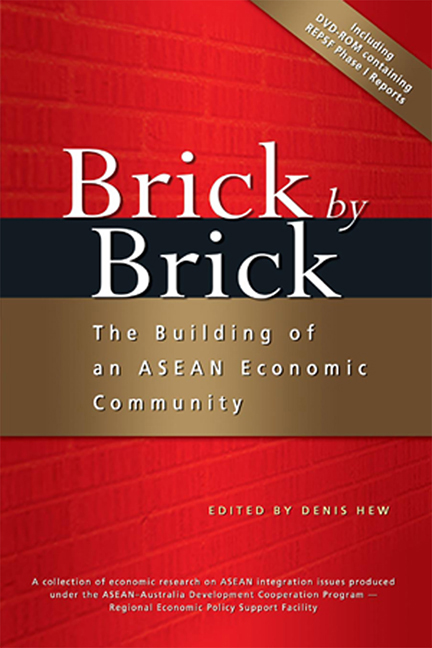Book contents
- Frontmatter
- Contents
- Foreword by Ong Keng Yong
- Foreword by Bruce Davis
- Acknowledgements by Academic Editor
- Acknowledgements by Technical Director REPSF
- The Contributors
- The Regional Economic Policy Support Facility
- 1 Introduction: Brick by Brick — The Building of an ASEAN Economic Community
- 2 What is a Single Market? An Application to the Case of ASEAN
- 3 The Challenge of Economic Integration for Transitional Economies of Southeast Asia
- 4 A Review of Regional Tariffs and Trade in the ASEAN Priority Goods Sectors
- 5 Non-tariff Barriers to Trade in the ASEAN Priority Goods Sectors
- 6 An Assessment of ASEAN's Priority Sectors for Fast-track Integration
- 7 ASEAN Tax Regimes: Impediment or Pathway to Greater Integration
- 8 An Overview of the Foreign Direct Investment Jurisprudence
- 9 ASEAN's FTA Negotiations with Dialogue Partners:Identifying Strengths and Weaknesses in Business Opportunities
- 10 Conclusion: Towards an ASEAN Economic Community by 2015
- Index
- Contents of Accompanying CD-ROM: AADCP-REPSF Phase I Research Program
5 - Non-tariff Barriers to Trade in the ASEAN Priority Goods Sectors
Published online by Cambridge University Press: 21 October 2015
- Frontmatter
- Contents
- Foreword by Ong Keng Yong
- Foreword by Bruce Davis
- Acknowledgements by Academic Editor
- Acknowledgements by Technical Director REPSF
- The Contributors
- The Regional Economic Policy Support Facility
- 1 Introduction: Brick by Brick — The Building of an ASEAN Economic Community
- 2 What is a Single Market? An Application to the Case of ASEAN
- 3 The Challenge of Economic Integration for Transitional Economies of Southeast Asia
- 4 A Review of Regional Tariffs and Trade in the ASEAN Priority Goods Sectors
- 5 Non-tariff Barriers to Trade in the ASEAN Priority Goods Sectors
- 6 An Assessment of ASEAN's Priority Sectors for Fast-track Integration
- 7 ASEAN Tax Regimes: Impediment or Pathway to Greater Integration
- 8 An Overview of the Foreign Direct Investment Jurisprudence
- 9 ASEAN's FTA Negotiations with Dialogue Partners:Identifying Strengths and Weaknesses in Business Opportunities
- 10 Conclusion: Towards an ASEAN Economic Community by 2015
- Index
- Contents of Accompanying CD-ROM: AADCP-REPSF Phase I Research Program
Summary
Background
Non-tariff barriers (NTBs) have been acknowledged by ASEAN members to be as critical as tariffs in the pursuit of regional trade and integration objectives. Members first committed to their minimization alongside tariffs in the 1977 Agreement on ASEAN Preferential Trading Arrangements. This was reiterated in the 1987 Memorandum of Understanding on the Standstill and Rollback on Non-Tariff Barriers, and again upon the creation of the ASEAN Free Trade Area (AFTA), when a 2003 deadline for elimination was set. Under the broader objective of an ASEAN Economic Community, declarations by the AFTA Council and ASEAN Economic Ministers were reinforced by the recommendation of the High-Level Task Force (HLTF) on ASEAN Economic Integration for members “to ensure transparency on non-tariff measures (NTMs) and eliminate those that are barriers to trade”. Accordingly, the Roadmap for Integration of ASEAN specified that NTBs are to be eliminated by 2010 for the ASEAN-5, 2012 for the Philippines, and 2015/2018 by CLMV.
A work programme for this purpose has largely been implemented: (a) an ASEAN Database of Non-Tariff Measures was established based on members' notifications; (b) clear criteria were set to identify measures that are classified as barriers to trade; (c) a clear and definitive work programme for the removal of the barriers by 2005 was set; (d) the WTO Agreements on Technical Barriers to Trade, Sanitary and Phyto-Sanitary Measures, and Import Licensing Procedures were adopted and implementation guidelines were developed. A mechanism for addressing complaints was also instituted. Although it is unclear whether the work programme envisioned the actual removal of trade barriers within its defined time-frame, it has produced another work programme for the removal of trade barriers. Working definitions of NTM types were adopted from the UNCTAD Coding Scheme for Trade Control Measures, consisting of the following:
• Para-tariff measures: customs surcharges, additional taxes and charges, decreed customs valuation
• Price control measures: administrative pricing, voluntary export restraint, variable charges
• Finance measures: advance payment requirements, regulations concerning terms of payment for imports, transfer delays and queueing
• Quantity control measures: non-automatic licensing, quotas, prohibitions, export restraint arrangements, enterprise-specific restrictions
• Monopolistic measures: single channel for imports, compulsory national services
• Technical measures: technical regulations, pre-shipment inspection, special customs formalities
- Type
- Chapter
- Information
- Brick by BrickThe Building of an ASEAN Economic Community, pp. 86 - 115Publisher: ISEAS–Yusof Ishak InstitutePrint publication year: 2007

